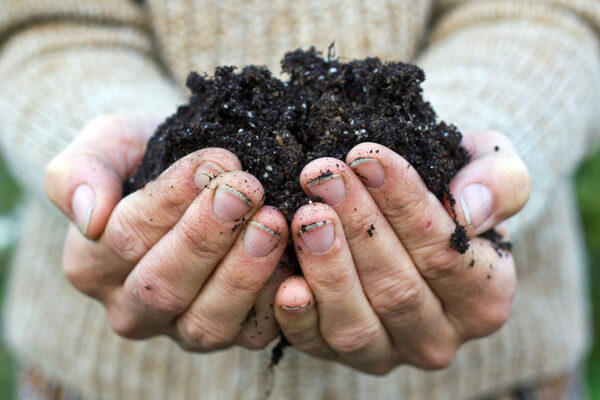Composting plant waste
Anyone who composts green waste is rewarded with an ideal soil conditioner. Burning green waste is only permitted in exceptional cases.
Composting plant waste
Anyone who composts plant-based garden waste such as leaves and lawn cuttings will be rewarded with an ideal soil conditioner. Burning green waste is only permitted in exceptional cases.
Garden waste is subject to the provisions of the Closed Substance Cycle Waste Management Act. According to this law, the producers or owners of waste are obliged to recycle it. The best way to recycle plant waste is to compost it on site. This keeps the nutrients in the cycle of recyclable materials and makes them available again for plants and animals via the soil.
Almost every garden can have its own composting area. Information on composting is available from the Umweltladen, and a free composting guide is available from the Federal Environment Agency (see link below).
Have it composted
If you cannot or do not want to set up a composting area in your garden, you can also have garden waste recycled. The plant residues are then processed in a waste treatment plant and then used for agricultural or thermal purposes.
The following options are available for disposal:
Plant residues, green cuttings up to twelve centimetres in diameter or plants and roots infected with pathogens
- via the organic waste garbage can,
- via paper bags, which are placed next to the garbage cans on the day the organic waste bins are emptied,
- at one of the three Wiesbaden recycling centers or at the small collection point of the landfill, free of charge up to 0.7 meters3 (this corresponds to approximately one trunk load),
- or (up to 16 centimeters in diameter) via the ELW container service, telephone 0611 71532.
The paper sacks are available for 2.00 euros at
- Small collection point at the landfill site
Landfill street 15
Monday to Friday 7 a.m. to 3.30 p.m., Saturday 8 a.m. to 1 p.m. - ELW recycling centers
Bierstadt, Kloppenheimer Straße 30
Nordenstadt, Borsigstraße
Dotzheim - Willi-Werner-Straße 11, closed on Mondays, Tuesday to Friday 8.30 a.m. to 5 p.m., Saturday 8.30 a.m. to 4 p.m. - all local administrations (except Dotzheim)
- Environmental shop
Luisenstrasse 19, Monday, Tuesday, Friday and Saturday 10 a.m. to 2 p.m., Wednesday and Thursday 1 p.m. to 6 p.m.
Recycling before incineration
If it is not possible to recycle garden waste or have it recycled for economic reasons, the ordinance on the disposal of plant waste outside of waste disposal facilities applies in Hesse. According to this regulation, agricultural and horticultural plant waste may be incinerated outside of built-up areas on the property on which it is produced.
However, the recycling of waste always has priority over its disposal by incineration.
If, despite all the ecological and waste management disadvantages, it is not possible to avoid burning plant waste, a number of rules and measures must be observed in order to avoid risks to life, health and the environment:
- Burning is only permitted under constant supervision in dry weather from Monday to Friday from 8 am to 4 pm and on Saturdays from 8 am to 12 noon. The current fire hazard level must be taken into account.
- The following minimum distances must be observed:
100 meters from residential buildings and freeways
50 meters from other traffic routes
35 meters from other buildings
20 meters from tree avenues, trees, unharvested grain fields
5 meters to the property boundary - Care must be taken to ensure that there are no birds' nests or other animals in the piles of branches.
- No additional materials may be used to light the fire that could endanger people or cause a strong smoke or odor nuisance.
- The waste must be dry enough to burn with as little smoke as possible.
- Burning must be controlled in such a way that the fire is kept under constant control. Burning should be carried out against the wind as far as possible. The fire must be extinguished if there is a strong wind or if heavy smoke development causes a traffic obstruction or a considerable nuisance to the general public.
- Suitable extinguishing agents should always be available when burning the wood.
- Before leaving the burning area, the supervisors must ensure that the fire and embers have been extinguished. The combustion residue must be worked into the ground immediately.
Obligation to notify
If more than two cubic meters of plant waste is burned, the Environmental Agency must be notified at least two working days before the start. The Environment Agency may issue the necessary orders to maintain public safety and order, in particular with regard to supervision and the provision of fire extinguishing equipment.
The notification must include
- Date of the incineration
- Location of the property on which the plant waste is to be incinerated (district, parcel and parcel number)
- Type and quantity of the plant waste
- Names and addresses of the supervisors
